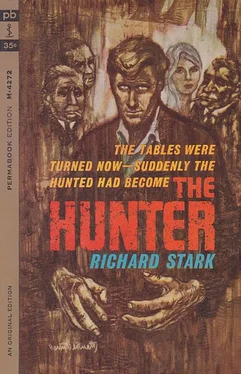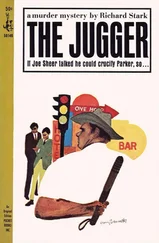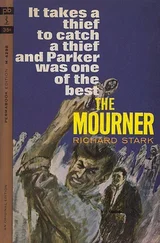The time went by and he settled into his life, getting used to the job and the people and the city, knowing that he was doing good work and that he would within a year or two be in line for a boost up the ladder. Keeley’s Island and the estate and the eighty thousand dollars gradually faded into memory, until a guy named Stegman told him that Parker was alive and looking.
The dead man fulfilled his ambitions. He got the best hotel suite and the best professional lay. And he got them just in time.
For Parker, it had been a cold thin trail from Stegman the cabman in Canarsie to the window of the St. David Hotel. The Canarsie thing had been a dead end. Lynn had been easy to find; she’d had a telephone listing under her own name. No reason for her not to — Parker was supposed to be dead. But Mal was more cautious. Or he was using a different name.
So Parker had come back to Manhattan from Canarsie, to the hotel where they’d kept the room for him because he hadn’t told them otherwise. He’d stripped off the clothing he’d worn for the last three days, showered and shaved, dressed again, and gone out for something to eat, and to think it over...
Sitting at the table in the restaurant, he’d worked it out in his mind. He’d tried to get to Mal through Lynn, and the trail had gone cold almost before it started. So now he’d have to try it a different way. Mal was supposed to be connected with the syndicate again. Maybe he could find him through the syndicate.
He didn’t like it that way. Syndicate people had a reputation for sticking together. He’d start nosing around and, the first thing, Mal would hear about it. Mal would know he was alive and looking for him. But it ought to flush him out. And otherwise the whole thing was hung up, no place to go.
He finished his meal and took a cab uptown to Central Park West and 104th Street. This was the wrong end of the park where the slums had spread south and east to lap at the very edge of the greenery. Parker walked west on 104th till he came to the grocery store. BODEGA, it called itself, Spanish for grocery, in black letters on yellow, beneath the Pepsi-Cola emblem. Underneath BODEGA it gave the proprietor’s name in smaller black letters. Delgardo.
Inside there was a stink compounded of roach poison, rotted flour, floor wax, old wood, humankind and a hundred other things. Two short heavy women in shiny black fingered the hard rolls. In the narrow space behind the counter a tiny fat man with a thick moustache scratched his left elbow and looked at nothing at all.
Parker pushed past the women and said to the man, “Is Jimmy around these days?”
Delgardo kept scratching his elbow. His eyes came back from infinity and studied Parker’s face. “You a friend of Jimmy’s?”
“Yeah.”
“So how come you don’t know where he is?”
“We lost touch.”
“So how come I never seen you before?”
“Jimmy drove for me on that payroll job in Buffalo.”
Delgardo’s hands twitched suddenly, and his eyes flicked in alarm to the two women. In a quick undertone he said, “Don’t talk that way.”
Without lowering his voice Parker said, “You wanted to know who I was. Now you know. Now you can tell me where Jimmy is.”
Delgardo fidgeted a minute, but the two women had shown no signs of interest. He fingered his mustache nervously and said, “Come in the back.”
Parker followed him deeper into the store, past a greasy curtain. In the back room the stink was even stronger. Delgardo, smelling of peppers, came close to whisper, “He’s in Canada. Driving, you know.”
“Cigarettes?”
“Yes.”
“When’s he coming back?”
“Two, three days.”
“Gimme pencil and paper.”
“Yes. Wait here.”
Parker waited, lighting a cigarette against the stink, while Delgardo went back to the front of the store. There was a flurry of rapid-fire Spanish between Delgardo and one or both of the women. They’d been stealing while he was in back.
He came back angry, and took a deep breath. He shrugged at Parker. “You know how they are.”
He gave him a long yellow pencil and a greasy three-by-five memo pad and Parker wrote down the name of the hotel.
“When he comes back, he should call me there. Parker, tell him. If I’m not in, leave a message.”
“Parker? You better write it down.”
“It’s an easy name to remember.”
Parker gave him back the memo pad and pencil. Delgardo hesitated, still wanting him to write the name down, then shrugged and led the way back to the front of the store.
The two women were still there, looking silent and frightened. Two uniformed policemen were there, too, filling the store. Their expressions blank and hard, they studied Parker, and Parker said, “Wallet.” He reached slowly to his back pocket. They waited, and Parker pulled out the wallet and handed it to the nearest of them.
They both read the driver’s license, giving his name as Edward Johnson, and then they gave the wallet back and one of them said, “What was the business in the back of the store? Did you buy something or sell something?”
“Neither.”
“Nothing like that, officers,” said Delgardo hurriedly. “You know me, I don’t do nothing like that.” He was sweating beneath his mustache.
“Nothing like what?” one of the cops asked.
Delgardo looked flustered. Parker said, “Nothing like junk.” He shucked off his jacket, rolled up his shirt sleeves, showed them his bare arms. “I don’t take it, buy it, sell it or carry it,” he said. “Get the broads out of here, I’ll show you my legs. No needle marks there either.”
“That won’t be necessary,” said the talking cop. “Just empty your pockets. You too, Delgardo. And let’s see the pad.”
He glanced at the memo pad, looked at Parker. “What’s doing at the Carlington Hotel?”
“I’m staying there,” Parker said.
“That isn’t what it said on your driver’s license.”
“I had a fight with my wife.”
“What was the business in the back of the store?”
“We had a Coke together,” said Parker. “I’m an old friend of Jimmy’s. I come around to look him up.”
“An old friend from where?”
“Upstate. We worked for the same trucker, up in Buffalo.”
“How come you don’t have a chauffeur’s license?”
“I don’t do that kind of work any more.”
“What kind of work do you do now?”
“I’m unemployed. I was laid off. That’s what the fight was all about.”
“What fight?”
“With my wife. I told you.”
“Laid off from where?”
“General Electric. Out on the Island.”
The cop chewed the inside of his cheek a minute, and glanced at his partner. “You tell a good story, Johnson. But you feel wrong.”
Parker shrugged.
The cop said, “How come you’re so hipped on narcotics? How come you brought the subject up the minute you saw us?”
“The neighborhood has a reputation,” Parker said. “I been reading the Post. ”
“Yeah. Lean up against the wall there.”
Parker leaned forward, palms fiat against the wall, and the cop frisked him briefly, then stepped back, saying, “Okay.”
“I’m clean,” Parker said. “Do I take my goods back now?”
“Yes.”
Parker took his wallet and change and cigarettes from the counter top and put them back in his pocket, watching as Delgardo was frisked and also found clean. The talking cop nodded sourly at Parker and said, “You can go. I suppose we’ll be seeing you around.”
“I doubt it,” Parker said. “It’s more civilized downtown.”
“We didn’t ask for this precinct,” the cop said.
Читать дальше












